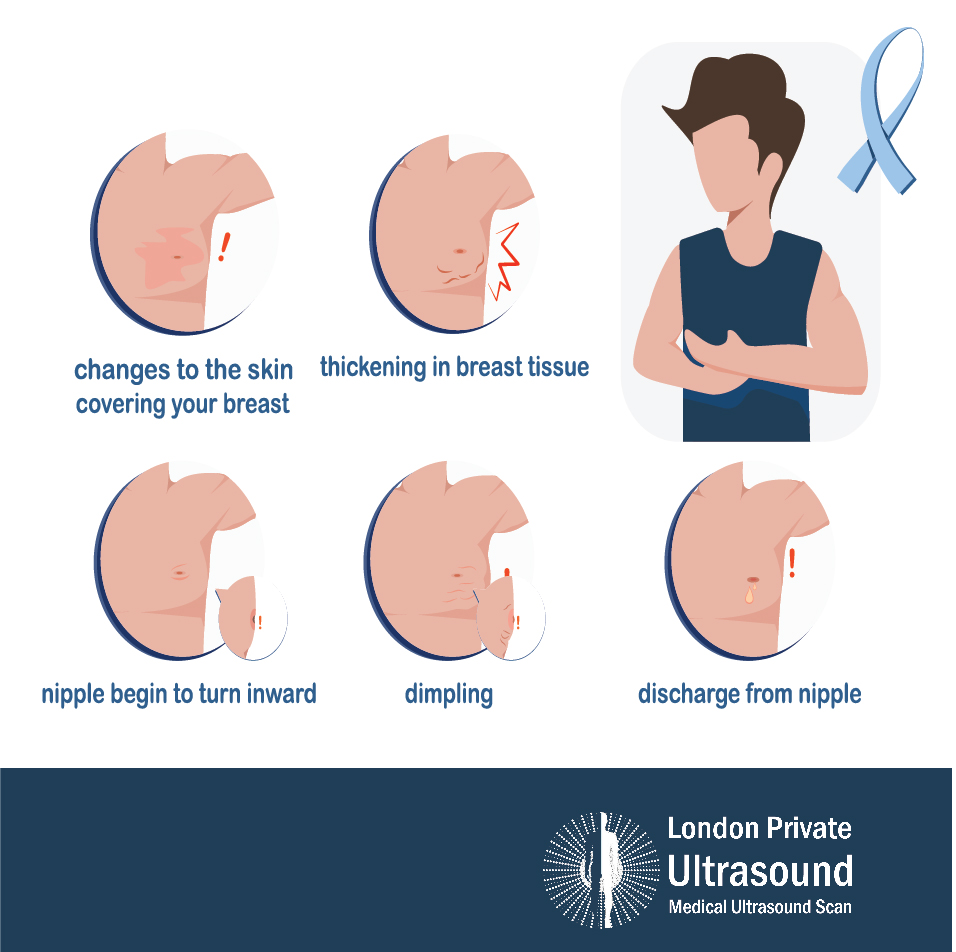Mens Cancer – Guidance from LPU
Mens cancer clinics
London Private Ultrasound (LPU) provide dedicated Men’s Cancer Assessment Clinics for those concerned about potential cancer symptoms and seeking accessible healthcare solutions. In a world where navigating health concerns can be overwhelming, our team of expert practitioners is here to simplify the process for you. This guide aims to provide essential insights into common cancer types affecting men while highlighting the diagnostic services available at our clinic and extensive health resources designed to allow you to access early indications of health problems and how best to combat these illnesses to reverse or manage the condition.
Men’s health is a critical aspect of overall well-being, and cancer poses a significant threat to the male population. Various types of cancer can affect men, each with its unique characteristics and challenges. Understanding these cancers is crucial for early detection, prevention, and effective treatment. In this exploration of men’s cancer, we will delve into the most common types, shedding light on their prevalence and potential impact on the lives of men.
Common Types of Men's Cancer
The most common types of Men’s Cancer can be summarised as the following:
Prostate Cancer: Prostate cancer is one of the most prevalent cancers among men, affecting the prostate gland—a crucial part of the male reproductive system. Regular screening is essential for early detection, as symptoms may not manifest until later stages. To give you some indication of the prevalence during 2018, there were approximately 49,000 new cases of prostate cancer diagnosed and Prostate Cancer UK believes the annual average to be higher.
It is estimated that around 1 in 8 men will be diagnosed with prostate cancer during their lifetime. Prostate cancer has a relatively high survival rate, with around 98% of men surviving for at least one year after early diagnosis.
Liver Cancer: Liver cancer is more common in men than in women. Liver cancer in men is a significant health issue, often linked to factors like chronic hepatitis, alcohol consumption, and obesity. It’s vital for men to be aware of these risk factors and prioritize regular check-ups to detect liver cancer early when treatment options may be more effective. The survival rate for liver cancer can vary depending on the stage at diagnosis and treatment options.
Pancreatic Cancer: Pancreatic cancer in men is a serious concern, often diagnosed at an advanced stage, making it challenging to treat. Awareness of risk factors and early diagnosis is crucial. While it’s less common in men than in women, it remains a significant health issue with a relatively low survival rate. Seeking medical attention for persistent abdominal pain, weight loss, jaundice, or digestive issues is essential to improve the chances of early diagnosis and effective treatment. Pancreatic cancer is less common but has a lower survival rate. In 2018, there were approximately 5,900 new cases of pancreatic cancer in the UK.
Lung Cancer: As a leading cause of cancer-related deaths in men, lung cancer often develops due to smoking or exposure to environmental factors. Early detection through imaging and lifestyle changes can play a crucial role in managing this condition.
Colorectal Cancer: Colorectal cancer affects the colon or rectum and is commonly diagnosed in men. Regular screenings, such as colonoscopies, are vital for detecting precancerous polyps and preventing the progression of the disease.
Testicular Cancer: Though relatively rare, testicular cancer primarily affects younger men. Self-examination and awareness of changes in the testicles are key factors in early detection, leading to higher rates of successful treatment. In the UK, there were around 2,400 new cases of testicular cancer in 2018.
Testicular cancer has a high survival rate, with more than 98% of men surviving for at least one year after diagnosis.
Bladder Cancer: Bladder cancer can impact men of all ages, with smoking and exposure to certain chemicals being common risk factors. Symptoms may include blood in the urine, and early diagnosis is crucial for effective intervention. In the UK, bladder cancer is the 7th most common cancer in men.In 2018, there were approximately 7,200 new cases of bladder cancer diagnosed in men in the UK.
Kidney Cancer: Men are more prone to kidney cancer, which typically affects the kidneys’ small tubes. Symptoms may include blood in the urine, back pain, and unintentional weight loss. Timely diagnosis can improve treatment outcomes.
Signs and Symptoms of Mens Cancer
We understand that health concerns can be a source of anxiety, and our goal is to offer clarity and support. This resource is crafted to empower you with information, facilitating informed decisions about your health. Rest assured, our expert team is committed to delivering efficient and patient-centric care and you are welcome to contact us via any of the chat, phone or email links provided – our clinicians will be happy to assist and provide guidance about the most suitable consultations, tests and appointment types for you.
As you explore this guide, you’ll find valuable information on signs, symptoms, and the importance of early detection. We’ve designed our services to be accessible, ensuring that you can take proactive steps towards your well-being. Our clinic, staffed by experienced practitioners, is equipped to provide comprehensive diagnostic services that can potentially be life-changing. You do not need to have a GP referral to book any of our clinics.
Your health is our priority, and we’re here to guide you through the process with minimal stress. Take a step forward in understanding and addressing your concerns, and understand why London trusts in the expertise of our dedicated team.
Can Men Get Breast Cancer?
One question we frequently get asked is, “Can men get breast cancer?” The answer is yes, and understanding the signs, symptoms, and stages is crucial for early detection and effective management. At our clinic, we recognize the importance of providing comprehensive information and advanced diagnostic services for men concerned about breast cancer.
Signs and Symptoms of Breast Cancer in Men:
Breast cancer in men often presents with subtle signs, such as a painless lump or changes in the nipple, skin, or size of the breast. While these symptoms may not always indicate cancer, it’s essential to address any concerns promptly.
Stages of Breast Cancer:
Breast cancer in males, like in females, is categorized into stages, ranging from 0 to 5 (IV). Early detection significantly improves outcomes. Our clinic offers advanced ultrasound screenings, enabling precise diagnosis and staging to guide appropriate treatment plans.

Understanding the anxiety surrounding health concerns, our clinic is committed to offering accessible and expert care. For those worried about breast cancer, our advanced ultrasound screenings for men provide accurate results, aiding in early detection.
In addition to breast screenings, our clinic offers comprehensive health services. From experienced GPs providing consultations to specialized blood tests and total body health checks for lymph nodes, our diagnostic approach is thorough yet minimally invasive.
If you’re experiencing symptoms or have concerns about breast health, our experienced practitioners are here to guide you through the process. Schedule a consultation where our GPs can provide tailored advice based on your health history and symptoms.
Following the consultation, our clinic offers advanced diagnostic services, including ultrasound screenings. The results are compiled into detailed reports, ensuring a clear understanding of your health status. These reports serve as valuable tools for informed decision-making and can be discussed further with our practitioners during follow-up consultations.
At our clinic, we prioritize your well-being, providing a supportive environment for men seeking answers about breast health. Take proactive steps towards your health journey with confidence, knowing that our expert team is here to address your concerns with care and precision.
Breast Cancer in Men – the stats
Breast cancer in men is relatively rare compared to women but can occur. The exact statistics may vary based on the year and region, so it’s crucial to refer to the latest data from reputable sources. In 2020, there were 390 new cases of male breast cancer diagnosed in the UK.
As of 2022, the American Cancer Society estimates that about 2,650 new cases of invasive breast cancer will be diagnosed in men in the United States, and around 530 men will die from breast cancer. These numbers represent a small fraction of overall breast cancer cases.
Bladder Cancer Symptoms in Men:
Signs and Symptoms: Bladder cancer symptoms in men can include blood in the urine (hematuria), frequent urination, pain or burning during urination, and back or pelvic pain. While these symptoms may be indicative of various conditions, it’s crucial to consult a healthcare professional if you experience persistent or concerning signs.
1 in 50 UK males and 1 in 133 UK females will be diagnosed with bladder cancer in their lifetime.
According to Cancer Research UK (unknown date)
Our Clinic’s Approach: At our clinic, we understand the significance of prompt diagnosis. Our practitioners specialize in evaluating symptoms, conducting thorough examinations, and utilizing advanced diagnostic tools to assess bladder health. Whether you are experiencing discomfort or have specific concerns, our clinic offers comprehensive consultations and diagnostic services tailored to your needs.
Prostate Cancer Symptoms in Men:
Signs and Symptoms: Prostate cancer symptoms in men can include difficulty urinating, a weak or interrupted urine flow, blood in the urine or semen, and persistent discomfort in the pelvic area. However, it’s important to note that early-stage prostate cancer may not manifest noticeable symptoms. Regular check-ups and consultations are essential for early detection.
Our Clinic’s Approach: Navigating concerns related to prostate health is a priority at our clinic. We provide specialized consultations with experienced practitioners who assess symptoms, conduct thorough examinations, and recommend appropriate diagnostic procedures. Our clinic’s commitment to advanced medical services ensures that you receive accurate and timely information about your prostate health.
It is estimated that more than 52,000 men are diagnosed with prostate cancer every year.
According to Prostate Cancer UK (unknown date)
Ultrasound detection and Total Body Health Checks
Ultrasound is a safe and non-invasive imaging technique that can be used to detect cancer early. Ultrasound uses high-frequency sound waves to create images of the inside of the body.
Ultrasound can be used to detect tumours in the organs, and musculoskeletal system, as well as to assess the size, shape, and margins of a tumour we can also provide blood tests and general GP services. This information can be helpful to determine any risk that may exist and plan appropriate treatments and lifestyle changes.

If a tumour is found on ultrasound, your clinician may recommend further investigations to explore the nature of the tumour.
